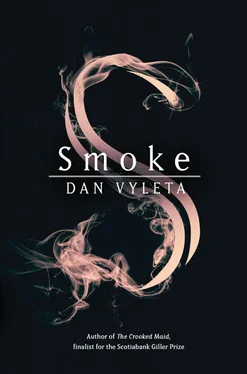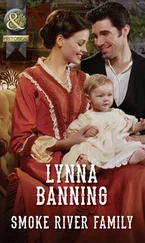“It don’t matter down below” is all he says. “You know it don’t.”
“That’s true enough,” answers the father. “It don’t matter down below.” And then he turns to Livia, screws up one eye, and asks, firmly but not unkindly, “What do you think, miss, about all this?”
She hesitates. Truth be told she is surprised: not only by the content of the words but by the fact that these people — farmers, miners — will discuss Smoke so readily, at the dinner table, wondering at its mystery. It had been, in her mind, an inquiry conducted only by her parents and their peers. By well-bred minds, as her teachers might have put it. By those who rule.
“Smoke is the incarnation of sin,” she says at last with all the meekness she has bred in herself through long years of practice. “It’s a dark mark from God. But it may be that we have been too eager to use it as an excuse for the sufferings of sinners.”
The eldest son snorts at this we . It excludes him and his whole family besides. But his brother, unspeaking, nods and attempts to spear a pickle. It eludes his knife point, jumps off the plate, rolls over the table leaving a trail of vinegar. On impulse, Livia picks it up and bites on it. It is so sharp it makes her eyes water; she coughs and coughs. Somehow it takes the tension out of the room. In the end even Jake is standing, laughing, slapping her back with the flat of his hand. Ten minutes later, their dinner finished, the men get up to walk to the village, have a pint at the pub.
There is nothing to do but hope that they won’t talk about the gentlefolk they are hosting for the night.
ф
They are back inside two hours. Mrs. Mosley remains busy in the kitchen, making preparations for the morrow. Livia is at her prayers. She would like to go to bed but does not know where. The cottage seems too small to hold them all. Charlie has nodded off on a chair, his face peaceful in sleep, his mouth fallen open around a half-formed smile. The men’s entrance wakes him. His first look darts to her, his second to Thomas. Making sure they are safe. It shouldn’t, but the sequence of those looks makes her flush with pleasure.
“Back already?” Mrs. Mosley greets her men. “And sober, like Christian men should be.” But her husband and son do not take up her bantering. “What’s wrong?”
“They’re the talk of the town,” Jake announces gruffly, jerking his head at Livia and Charlie. “Or their coach is, shot up on the high road. Fowler went to town this afternoon. Says it’s all everyone’s talking about. Rumour says Lady Naylor herself was inside and has been abducted. And then Sutter pipes up that he found a boat, what was left of it, stuck on some rocks a league downriver. Said it had a crest. He didn’t give it much thought at the time. Now the whole village is wondering what connects them, coach and boat. And who was inside.”
His father puts a hand on Jake’s arm. The gesture quiets him, makes him cede ground.
“You cannot stay here,” Mr. Mosley announces after a pause. “Not if you don’t want to be found. The whole village is talking. And management always has its man in the pub. Someone’s sure to come and ask questions.” All of a sudden a scrap of Smoke escapes him. He watches it rise, waves to disperse it. “Excuse me.”
It is like he is apologising for breaking wind at the table. It is the only hint that he is agitated.
“We will go,” says Charlie. “First thing in the morning.”
The man wags his chin in thought.
“No you won’t. That one”—he points to Thomas—“he can’t walk. Not for a while. And he’ll need a doctor, or a nurse. He ain’t out the woods yet.” He pauses, sets to lighting his pipe. “There is a place. Somewhere no one will see you. And even if they do, they won’t tell. That is, if you are serious. About disappearing for a while.”
He looks to Charlie for an answer, but Charlie looks to her. Livia understands the look. It’s her mother who will worry herself sick over her daughter’s disappearance. And it’s her mother who might have tried to have them killed.
It’s her decision.
But if she gets it wrong, it’s Charlie and Thomas who will die.
“When do we go?” she asks.
Mr. Mosley’s expression does not change. He draws at his pipe, exhales. “Tonight. But not before two or thereabouts. In between shifts.”
Before he can turn away, she walks over to him and looks him in the eye.
“You don’t have to do this. Thank you that you do.”
His face darkens. It takes her a second to comprehend it’s a blush.
“It was Francis’s idea,” he says, pointing at his silent son. “On the way over. I wasn’t sure at first. But now I think he’s right.” He pauses, turns to his wife. “This one will need some woman things, I imagine. And some cutlery for the both of them, a jug or something of the kind, and any blankets we can spare.”
Mrs. Mosley looks at him sourly. “Don’t you tell me what to do.”
Her hands are already busy filling a basket. A flask goes in, two cups, and a pair of bloomers so large, Livia will have to gird them with a belt.
“Where are they taking us?” she asks as she accepts the basket some hours later.
The woman gives her a long, solemn look. Perhaps she thinks her men are making a mistake. Or else that Livia and Charlie are.
“Where?” she repeats at long last. “Where we all go in the end. Underground.”
The news reaches us at four thirty-three by the tall Comtoise clock in the front parlour. A group of riders bring it, from town, their leader a magistrate, the others good citizens who appear to have nothing better to do. A “posse,” as one of them is heard to say. Keeping the queen’s peace.
There is the news as it is presented to milady; and the news as it knocks on the kitchen door, carried there by a stable hand who talked to one of the townsmen’s valets while he rubbed down his horse. Same information, different words. We get the scenic version ’round the kitchen way: get the gore, the smells, words learned from penny dreadfuls. The horses “butch’red,” the coach “blown all to smithereens”; Mr. Price “slain,” his body “yawning,” belly open to the sun, its contents pilfered by crows. They left him there, this posse. Too heavy to carry; too bloody, too, no doubt, too smelly and messy to sling across one’s horse. A cart will be sent to pick him up.
There is no trace of either of the boys.
Milady, they say, takes it well. I am not there to see it: as luck will have it I am overseeing the annual cleaning of the silver, keeping the maids honest. Counting coffee spoons. I can picture her though, milady: pale and erect, making the man speak his thoughts in order. She has a serving girl carry refreshments out into the yard. I approve. We don’t want the men’s dust in our parlour, nor townsmen loitering in our halls.
Livia is sent for, to be appraised of the news. It is thus that it emerges that she is missing. Her maid says she rose before dawn and put on her travelling clothes. She, the maid, thought nothing of it. Now she is in tears. I shall dismiss her in the morning.
A search ensues. It transpires that a stable boy saw her leave the gate when it was still dark. He was relieving himself by the side of the shed. Did he wonder at her departure? The boy only shrugs. The ways of the gentry are a mystery to him. When I order him to be caned, he blanches and smokes. Ten licks of the rod will do him a world of good.
By this time young Spencer has taken charge of the party and ridden out, to hunt down the Gypsies, as he put it. Indeed a band was seen a week ago, albeit ten leagues to the south. He takes his bitch along. It pads out of its kennel, sniffs its master, gives a howl that curdles the blood. When he pets her, a tear is seen in young Spencer’s eye and his hand is said to shake. Grief for the valet, the kitchen wench says dreamily. She has romantic notions about the boy, and has spoken before of the “grace and tightness of his breeches.” When she smokes it holds the aroma of burnt cloves.
Читать дальше












